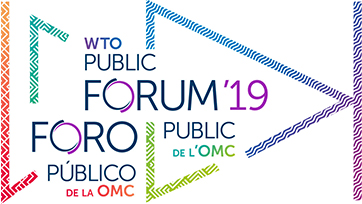WTO PUBLIC FORUM 2019
“Trading Forward: Adapting to a Changing World”
The trading landscape is increasingly characterized by changes in technology, production methods, employment patterns, demand patterns, demographics, and climate – to name a few. Last year's WTO Public Forum considered some of the changes influencing the trading system and how global trade would evolve over the coming decades. This year's Public Forum will go a step further and consider how trade, and the trading system can adapt to these changes. Under the main theme of 'Trading Forward: Adapting to a Changing World,' the sub-themes will be:
- services – the next trade frontier;
- the next generation – what do Millennials & Gen Z want to see from global trade; and
- the next chapter of the WTO – strengthening the trading system.
Technology has been a major driver of economic advances – making production easier, more efficient, cheaper and making services more tradeable. Production methods and processes have evolved due to factors such as automation and consumer expectations. Services have become the fastest growing segment of output, employment and trade and have rendered manufacturing activities and value chains more efficient. Employment patterns are shifting - with growth in skilled work outpacing that of unskilled work, the labour market becoming more flexible and the informal sector still representing a major part of developing economies. Demographic structures have also influenced employment patterns. Millennials and Generation Z (which are expected to represent over half the world's population by 2020) will constitute the majority of future workers. Environmental considerations have a bearing on all these factors and to a large extent are shaping most decisions from investment decisions to consumer choices.
With these and other factors transforming the trading landscape – how can countries, businesses and traders around the world best prepare and adapt? How can they ensure that the opportunities presented by technological advances benefit all sectors of the economy and at the same time address the challenges that come with such advances? What about the role of the future generation which represents our future leaders, workers, entrepreneurs and consumers? Their hopes and expectations for the future of global trade and global economic cooperation must be heard. With services representing a significant and growing portion of the global economy, how can countries leverage this sector as an opportunity to increase their participation in trade? What policies and regulations will facilitate services trade while at the same time addressing development needs and national policy concerns?
While the changes shaping the trading landscape offer opportunities and potential for growth, they also present challenges. How can the WTO respond to a world that is changing at such a rapid pace?
The Forum will bring together representatives of governments, private sector, civil society, academics and students to debate these issues and consider how the trading system can adapt to these changes and remain relevant.

Share
> Problems viewing this page?
Please contact [email protected] giving details of the operating system and web browser you are using.